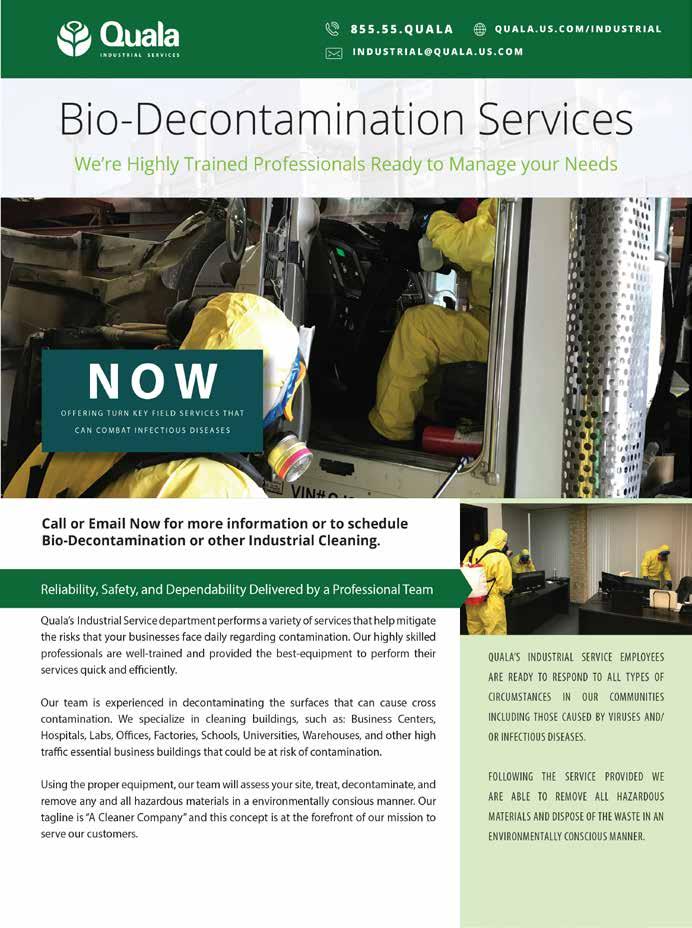
3 minute read
Mark Clark
Mark Clark Spilman Thomas & Battle, PLLC
Will 2021 Be Better?
Advertisement
WOW, just wow! As we close the book on 2020, only a small percentage of Americans are calling last year a success or fun or productive or anything positive (except for the stock market returns and even that was a roller coaster ride). Our memories of 2020 will include a worldwide pandemic that created economic disruption across the board, cancelled conferences, concerts and sporting events, working from home, virtual Zoom meetings, social distancing, masking up, a never ending political campaign, a seemingly unending presidential transition and, of course, ongoing depressed commodity prices for oil and gas. A couple of bright spots (other than the stock market) in 2020 include the record setting development of multiple vaccines to combat the Covid-19 pandemic and the merger of the Independent Oil and Gas Association of West Virginia, Inc. and the West Virginia Oil and Natural Gas Association, Inc. as the Gas and Oil Association of WV, Inc.
While there is likelihood for movement back towards a pre-pandemic lifestyle as a result of the vaccines, it will not happen as rapidly as many of us would like. The merger creating Gas and Oil Association of WV, Inc. (“GO-WV”) brings a more unified voice to promote all aspects of the oil and natural gas industry in West Virginia and brings improved finances needed to support and implement the objectives of GOWV. A single association speaking for the entire oil and gas industry is expected to streamline and enhance communications within the industry and with West Virginia government agencies and legislative bodies. The coming year should be an exciting time for GO-WV members under the continued leadership of Charlie Burd as Executive Director.
While no one expects the health and economic upheaval that the global pandemic generated in 2020 to recur in 2021, uncertainty in commodity markets and the regulatory climate will persist. For example, as of the end of December, control of the U.S. Senate remains uncertain until the winners of the two Georgia seats are determined in runoff elections on January 5, 2021. As discussed in last month’s article, the prospects of any quick statutory or regulatory revisions rests with control of the Senate. If both Georgia senate seats are won by Democrats, the negative statutory and regulatory impact on the oil and gas industry may be much more significant than if even one seat is won by a Republican.
From a more positive perspective because of the results of the November election, the West Virginia Legislature may be more able to address important issues promoted by GO-WV. Perhaps more importantly, the courts may be a source of some positive outcomes for the industry. Courts at both the federal and state level have become more conservative primarily as a result of the appointments by the Trump Administration and the advice and consent of the U.S. Senate. In an article by William Herlihy in this edition, he reports on a the Fourth Circuit Court of Appeals decision, Young v. Equinor, that represents a significant victory for producers regarding calculation and payment of royalties in the context of post-production expenses.
We will continue to closely monitor new statutory and regulatory initiatives of the Biden Administration. Likewise, we are following the court challenges to federal rules that became effective during 2020, such as the Navigable Waters Protection Rule (replacing the former Clean Water Rule) that became effective June 22, 2020, the Council on Environmental Quality rulemaking to relax National Environmental Policy Act requirements that became effective September 14, 2020 and the Oil and Natural Gas Sector: Emission Standards for New, Reconstructed, and Modified Sources Review - subparts OOOO and OOOOa that became effective September 14, 2020, and Oil and Natural Gas Sector: Emission Standards for New, Reconstructed, and Modified Sources Reconsideration that became effective November 16, 2020.
We are hopeful for a return to in person meetings and more normal social interactions during the course of 2021. Similarly, we hope for improved economic conditions that result in higher oil and natural gas prices and limited or no additional regulatory burdens on the industry. Of course, there will be some surprises along the way, but we wish you a happy and healthy 2021. If you questions regarding this article, please contact Mark Clark at mclark@spilmanlaw.com.






